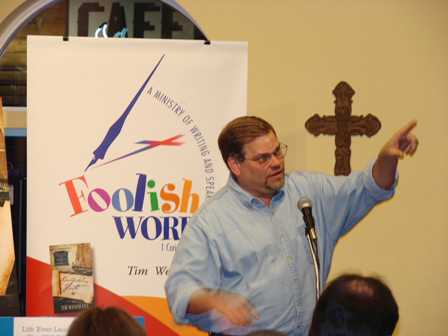I guess it goes without saying that any creative adult had a creative influencer early on in life. For me it was my dad. When I was in first grade he cast me in my first play as Tiny Tim in A Christmas Carol. Since then we have done countless shows together, even up until just a few years ago. He always had books around; always came to the haunted houses and plays that we made up when we were kids; always encouraged coloring a sunset purple because that’s the way it looked.
My dad, David Eggebrecht, is a:
- Writer
- Painter
- Director
- World Traveler
- Literature Professor
- Movie Buff
- Voracious Reader
- Shakespeare Expert
- And now…even a Blogger (you can read his blog here)
Though he is “retired,” he still goes into the office at Concordia University — Wisconsin every day where he continues to teach, write plays, paint, and direct college plays and musicals. He was the Academic Dean there for over twenty years.
I think my dad was a Renaissance Man even before there was such a thing.
So, here goes. Seven questions for my dad.
Tom: Define creativity.
Dave: The ability to look beyond the mundane and see the extra and the special in an object, an event, or a situation.
Tom: When did you first realize that you were “creative”?
Dave: Good question – I think when I was in Kindergarten and was asked to be Tiny Tim in a church production of A Christmas Carol. (Ed. Do you sense a theme here?) That got the juices flowing when I realized I could be someone/something beyond myself.
Tom: How do you cultivate your creativity?
Dave: I read a lot; I make up situations; I write to see what happens; I paint to see what happens; I work with a lot of really creative people.
Tom: How do you handle a creative block?
Dave: Leave it alone for a while, and it’ll come home, wagging its tail behind it. That’s true – go away from whatever, physically and/or mentally, then come back at it again later with what Robert Frost called “a new think.” Or just try a different approach.
Tom: When and where do you do your most creative work?
Dave: In my cave at my computer, but I can be creative anywhere with pen or pencil in hand.
Tom: Who is your “creative inspiration”? Why?
Dave: Grandpa Eggebrecht (Ed. Dave’s father) for one thing – he was great with his hands at creating things. Herb Arkebauer, my speech and drama teacher in high school – a very creative person whom I patterned my life after. He was always fun to be around he had so many creative ideas. Currently, probably John Dolphin (Career Stage Lighting Designer and founder of Mid-West Scenic), Steve Nibbe (Actor and High School Drama Teacher in the Madison, WI, area; once a student of Dave’s), Barb Gensler (Renowned in the Milwaukee area as a High School Drama Professional at Shorewood High School), creative people I have the pleasure of working with.
Tom: What advice do you have for aspiring “creatives”?
Dave: Keep an open mind, be willing to try, do, think new things, look at things with a different perspective, give whatever it is a “new think.”
What do you think of Dave’s ideas about creativity? Any new insights?










